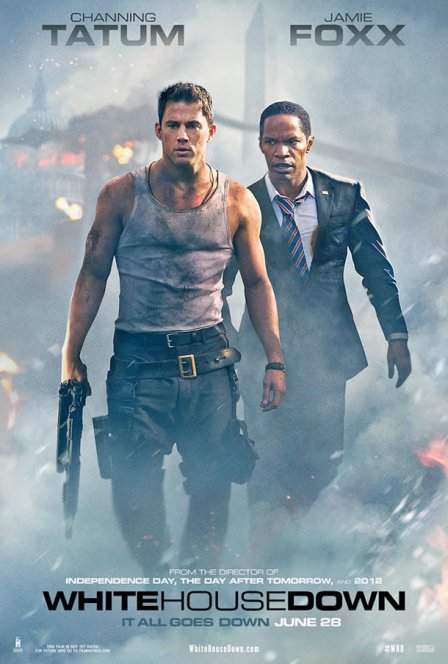White House Down features destruction porn of our nation’s capital, but unlike Olympus Has Fallen, there is no need to recoil from the realism. For his latest, director Roland Emmerich replaces portentous nationalism with a big, dumb spectacle — not that there’s anything wrong with that. White House Down knows exactly what kind of movie it is, and it doesn’t pretend to be anything more. What matters then is the level of craft, and it in fact succeeds without trying too hard. The good guys preserve their charm; the bad guys veer between menace and kooky zeal; and there’s even room for goofy, likable secondary characters.
When we begin, John Cale (Channing Tatum) is the driver to the Speaker of the House (Richard Jenkins), but he has a job interview at the White House. Cale brings along his daughter Emily (Joey King), and after a terrible interview, it’s time for the perfunctory White House tour. Everything goes to shit after Emily leaves the tour group for the bathroom. A bomber destroys the Capitol building, and repairmen in the White House turn out to be mercenaries. Walker, the head the Secret Service (James Woods), is the mastermind behind the operation, so it’s easy for the bad guys to take the building. But Cale breaks from the tour group in search of Emily and ends up with Walker instead. It’s up to both of them, of course, to save the world and blow up stuff real good.
The secret to the movie’s charm is how President Sawyer (Jamie Foxx) sheds the trappings of the office to become a badass action hero. When we first meet Sawyer, he’s a monument-loving idealist who trusts he can lead the world by example. After terrorists decimate the building, he’s picking up automatic weapons and even a bazooka. Sawyer plays Walker so that he’s surprised by the transition, and he’s responsible for some well-deserved laughs. But for all of the “Hail to the Gun-Wielding Chief” antics, this is Tatum’s show to run, and his performances may push him into A-list territory. Like Bruce Willis in Die Hard — a film from which Emmerich and screenwriter James Vanderbilt shamelessly borrow — he easily straddles the line between forcefulness and comedy. His character has moments of doubt and fear, and Tatum handles them with ease. He’s convincing as an action hero — buff and angry when he needs to be — but well-timed asides are what define the character.
Given Emmerich’s heavy-handed style, it’s almost surprising that Tatum and Foxx are so good. Emmerich is responsible for blockbusters like Independence Day and 2012; neither feature too much action choreography, and it shows. The fight scenes, with guns and without, are clunky and unfold with little suspense. When the action gets a bigger sense of scale, White House Down does achieve peak mayhem. There’s a fun, silly car chase where several armored drive around the north lawn, and there’s an eerily effective sequence where helicopters fly low through downtown Washington (I happen to live in DC, so I chuckled to myself when the helicopters took a wrong turn at Chinatown and headed to Capitol Hill, not the White House).
Several sub-plots involve nuclear weapons and the Presidential chain of command, and strong supporting actors are necessary to steer us through all the silliness. Woods sneers through the role of the wronged Secret Service Chief, and his motivations have scorched-earth logic to them. Maggie Gyllenhaal does what she can with a role that amounts to little more than breathlessly providing exposition into a walkie talkie. But the real standouts are from two relatively unknown character actors who know how to have fun. Jason Clarke, who was the chief interrogator in Zero Dark Thirty, warps his tortured character Emil Stenz into a henchman who exudes pure menace, while Canadian actor Nicolas Wright’s perfect comedic timing as Donnie the Tour Guide is responsible for the movie’s funniest lines.
With both its setting and the agenda of its villains, it’s tempting to shoehorn a political argument into White House Down. Sure, recent news creates some unintentionally hilarious coincidences: one character hacks into the White House computers after he announces he was an ex-contractor for the NSA. But the villain’s purpose is merely an excuse for action, not the other way around. Emmerich relishes iconic American symbols and understands that destroying them is an easy way to tug at our collective sense of security. Whereas Olympus Has Fallen has delusions of grandeur about the meaning of duty and sacrifice, White House Down aspires to nothing more than your money’s worth. Do not expect a message about American Foreign Policy from the same guy who blew up the White House during an alien invasion.

